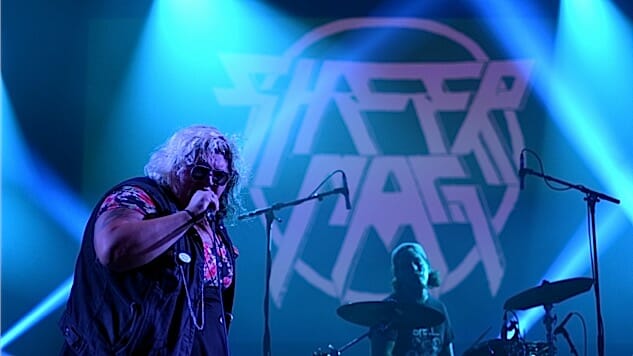For Sheer Mag, Balancing Protest and Play in 2017 Is a Tricky Business
The Philly garage rockers have something to say about America's issues, but saying it with rock music is harder than it seems.

Sheer Mag have never sounded like a punk band in the traditional sense. Not in the guitars, which chug out the kind of high-octane riffs that might as well expel plumes of motorcycle exhaust, nor in vocalist Tina Halladay’s bright, crackling hooks, nor in the power-pop-tinged melodies that weave it all together. It’s a sound that can’t help but channel the retro cool of a ‘70s dive bar jukebox, no matter what format it’s playing on, or where.
But Sheer Mag are a punk band in the ways that matter most in 2017. Since forming in Philadelphia back in 2014, they have espoused a fierce DIY ethos, remained unsigned despite having their pick of labels and, most important, honed the progressive ideologies that are now essential to their art and their community. The quintet, currently on tour behind their stellar debut LP, Need to Feel Your Love, didn’t originally set out to make political music, but that changed as they witnessed struggles with gentrification and housing quality in their Point Breeze neighborhood. On one new song, “Rank and File,” Halladay sings, “If you’ve fallen lonely on your cause / I got the rank and the file here to even the odds.” On the chugging “Can’t Play It Cool,” she sings, “We all do what we can to keep living to keep despite the pain / In a world that’s going insane / I’m just trying to find a way to explain.”
The ‘70s-style arena rock that Sheer Mag draws their inspiration from didn’t set much of a standard for social consciousness—many of its most famous acts, like Led Zeppelin and The Rolling Stones, left it with a reputation for misogyny, hedonism and appropriation. For Halladay, that made it all the more important for Sheer Mag to push the sound in a more thoughtful direction, one forged by the punk bands that followed those classic-rock monoliths—The Clash, Minor Threat, Dead Kennedys.
“I love rock ‘n’ roll, and it’s really hard to love something that probably hates you, if it had the chance,” says Halladay.
“I love rock ‘n’ roll, and it’s really hard to love something that probably hates you, if it had the chance,” she says. “All these [classic rock] motherfuckers have really bad history, but it’s cool to take it back from that place. It wasn’t always like that, of course, because white people didn’t invent rock ‘n’ roll.”
Guitarist and main lyricist Matt Palmer is careful to acknowledge the distinction between politics and art, but still sees a purpose for his band where the two overlap. “Sheer Mag is primarily entertainment about politics,” he says. “Real politics is like, organizing and taking to the streets and speaking and taking action. This is just music about that. But we wanted to create a soundtrack for those real political actions.”
That goal is more pronounced than ever on Need to Feel Your Love, which followed a trio of EPs that won Sheer Mag an early cult fanbase. As the new album’s title suggests, it’s dotted with love songs, but its gravity lies in pointed storytelling and protest anthems. Where other current artists politicize messages drawn from personal experience, Sheer Mag takes a wider—and inherently riskier—approach, sometimes addressing topics in times, places and experiences far from their own. “Suffer Me” is a fictionalized account of the 1969 Stonewall riots in New York; album closer “Sophie Scholl” narrates the execution of its namesake, a nonviolent anti-Nazi activist in 1940’s Germany.
-

-

-

-

-

-

-

-

-

-

-

-

-

-

-

-

-

-

-

-

-

-

-

-

-

-

-

-

-

-

-

-

-

-

-

-

-

-

-

-









































